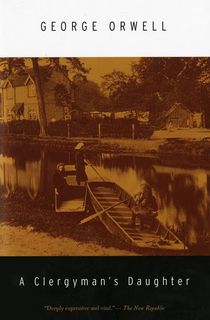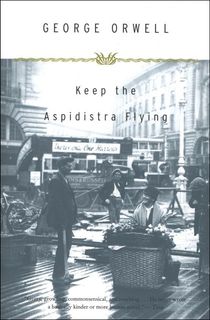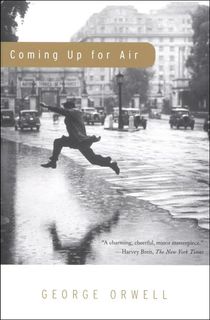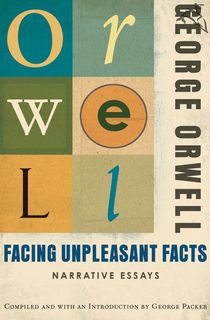It's not an exaggeration to say George Orwell books have changed American society as we know it. Born Eric Arthur Blair in 1903, George Orwell has had a substantial impact on both popular culture and the literary world—you know you've made it when people use your last name as an adjective (see: "Orwelllian"). We also have him to thank for words like “newspeak,” "doublespeak," “Big Brother” and even "bellyfeel."
What were George Orwell's most famous novels about?
A democratic socialist, Orwell never hesitated to express his political beliefs through his writing. Whether he was criticizing totalitarian governments, classism, or poverty, his books pointed out ugly-but-important truths about 20th-century life. And given the state of our modern-day world (and the return of his dystopian classic 1984 to best-seller lists after the 2016 election), it's safe to say his works are as relevant as ever.
We doubt Orwell would be surprised by this turn of events—as he once said, "In our age there is no such thing as 'keeping out of politics.' All issues are political issues, and politics itself is a mass of lies, evasions, folly, hatred and schizophrenia."
Of course, while 1984 and Animal Farm are pillars of high school literature curriculums, there are other George Orwell books worth exploring. Below, you’ll find the usual Orwell staples, but you’ll also learn about the rest of his notable novels and memoirs, plus a bonus essay collection published after his death in 1950.
Fictional George Orwell Books
1934

Burmese Days
Inspired by his days as an imperial police officer in Burma, Orwell wrote this 1934 novel over the course of several years. It focuses on John Flory, a 30-something timber merchant living in British-ruled Southeast Asia . As a white man, he’s respected within the community, but he’s also gained a respect for the native Burmese culture. Still, he spends much of his time schmoozing at the European Club—a group of other privileged white men with much more narrow-minded beliefs. Over glasses of whisky, the members must decide if they should welcome John’s friend, a prominent Indian doctor, into their exclusive circle. Their debate sets the stage for Orwell's criticism of British imperialism, as John waffles between his new friendships and his loyalty to the British empire.
1935

A Clergyman’s Daughter
Dorothy Hare’s life is simple but unfulfilling: She’s the daughter of an ungrateful clergyman, whose Suffolk home she dutifully tends. She makes costumes for church events, warding off the financial perils of the Depression era. She’s also a spinster with nothing that truly belongs to her alone. Everything falls apart when she’s struck by a sudden bout of amnesia—and comes to in the streets of London with little money and no memory.
Dorothy's quest to reassemble the pieces of her forgotten past will introduce her to fresh horrors, while rumors of romantic scandal spread throughout the Suffolk countryside. If the novel sounds bleak, it's because it is—though it's also an unflinching attack on capitalism and corrupt institutions.
1936

Keep the Aspidistra Flying
In this surprisingly short book, Orwell creates a protagonist in his own image. Gordon Comstock is a copywriter at an advertising agency who’s become increasingly frustrated with the materialism in his life and industry. He quits—then takes a lower-paying job that allows him to pursue his passion for poetry.
While his new lifestyle and credo look good on paper, reality eventually sets in: As he approaches poverty and is drained of creative inspiration, Gordon begins to question if money is as overrated as he initially believed.
1939

Coming Up for Air
As George Bowling travels to his boyhood home, old memories start to resurface. He dwells on the beloved landmarks of his past—from a quaint English village to a picturesque pool—only to realize that they’ve changed dramatically in his absence. These discoveries reaffirm his belief that another world war is on the horizon, stirring an even greater longing for his yesteryears and an even greater fear of the future. A novel about memory, loss, and time, Coming Up for Air masterfully captures the power and bittersweetness of nostalgia.
1945

Animal Farm
In what is perhaps the most famous George Orwell book, an army of farm animals plans a revolt against their human owner, with two young pigs—Snowball and Napoleon—as their leaders.
They succeed, but it isn’t long before corruption sinks its claws into their newfound utopia: Overcome by greed and a desire for power, Napoleon turns on Snowflake to gain absolute control of Manor Farm. Technically a novella. Animal Farm is an allegorical take on the inciting events of the Russian Revolution and an unapologetic statement against Stalinism.
1949

1984
Orwell’s famous dystopian novel takes place in Oceania, formerly Great Britain and a super-state ruled by the Party. A totalitarian government lead by the mysterious Big Brother, the Party employs a harsh police force that limits individuality, strips people of their most basic freedoms, and prevents political opposition. Winston Smith appears to be a dutiful supporter of the Party, but he secretly hungers for rebellion. Along with his forbidden lover, Winston joins an underground resistance group that sets out to destroy their oppressors—with disastrous consequences.
Unsurprisingly, writing 1984 was no picnic. As Europe slowly rose from the ashes of World War II, Orwell was plagued by his own troubles—namely, his wife’s death and his own battle with tuberculosis. He tucked himself away on a remote Scottish island, where he worked on the manuscript despite his rapidly declining health. After years of obsessive fine-tuning, 1984 was finally published in 1949—about seven months before Orwell’s death. Today, it's not only the benchmark for all dystopian fiction, but one of the most important (and prescient) novels of the 20th century.
Nonfiction George Orwell Books
1933

Down and Out in Paris and London
Orwell’s debut and first “memoir,” Down and Out in Paris and London recounts his time among the cities' poorest residents. We first see the narrator—a young writer who may be an exaggerated version of Orwell—living in a run-down Paris hotel. When he's robbed and loses his teaching gig, he’s forced to pawn his clothing and find employment in the restaurant business. As Orwell describes scraping by as a dishwasher, he reveals how the “City of Light” is actually a dark, unforgiving place ravaged by poverty and injustice.
The second half takes readers to London, where the narrator travels for a new job. Upon his arrival, he quickly learns that his employers aren’t actually there—and that, once again, he’s left with nothing. This part of the story follows his life as a tramp, highlighting the harsh realities of being a poor transient worker in 1920s London. It's a grim read—in fact, Orwell created his pen name for this work so as to not embarrass his family.
1937

The Road to Wigan Pier
Like Down and Out in Paris and London, The Road to Wigan Pier is also split into two distinct parts. Set three years before World War II, the first half presents an accurate picture of the working class in Northern England. Orwell immersed himself in the world of his subjects, and he recounts their stories here—particularly the hardscrabble lives of coal miners and their families. He follows these harrowing profiles with a long argument about how socialism will fix the region's abominable living conditions.
1938

Homage to Catalonia
In Homage to Catalonia, Orwell describes his time as a private, corporal, and lieutenant in the Spanish Civil War. Though he initially set out to cover the conflict as a journalist, Orwell eventually joined an anti-Stalinist militia party—and found himself in the thick of battle on many occasions. The book chronicles his tour throughout Spain, the politics of the country, his experiences at the front, and various military operations he helped execute. Orwell’s strong convictions made him an enthusiastic soldier and produced an eye-opening and riveting memoir.
Essays
1986

Facing Unpleasant Facts
There are many collections of George Orwell's writings that don't count toward his official bibliography, but this is one of our favorites. Facing Unpleasant Facts is a posthumously published collection of essays written over a twenty-year period of Orwell’s life.
Among the well-known classics are hidden gems about Orwell’s unhappy childhood at a British boarding school. Meanwhile, excerpts of his diary include further reflections on his time in the deadly Spanish Civil War. Altogether, the collection is a window into one of the most brilliant minds of the 20th century.
Keep Reading: Why You Should Read Animal Farm, George Orwell's Short Satire
Featured photo courtesy of Alchetron






